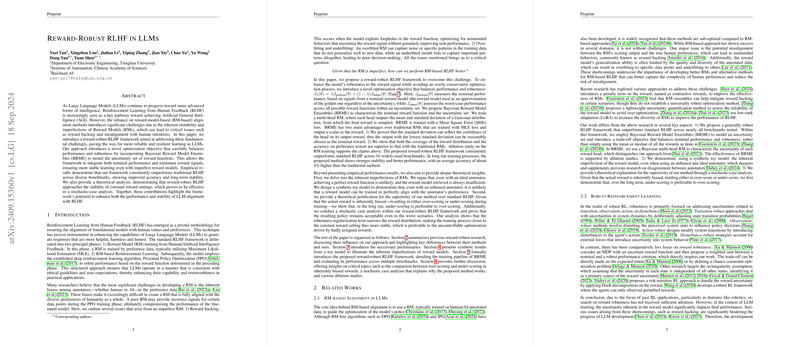Reward-Robust RLHF in LLMs
The paper Reward-Robust RLHF in LLMs addresses a critical challenge in the training and alignment of LLMs through Reinforcement Learning from Human Feedback (RLHF). As LLMs move closer to achieving more advanced forms of intelligence, ensuring that these models align closely with human values and intents while avoiding issues such as reward hacking becomes increasingly significant.
Introduction
The RLHF methodology operates on two principal phases: training a Reward Model (RM) based on human or AI-generated preference data, followed by Proximal Policy Optimization (PPO) using the RM. While effective, this framework suffers from vulnerabilities introduced by the intrinsic biases and imperfections in the RMs. These imperfections manifest in issues like reward hacking, where the model optimizes unintended behaviors, and overfitting or underfitting, which can compromise the model’s generalization capabilities.
Proposed Framework
To mitigate these vulnerabilities, the paper introduces a reward-robust RLHF framework. The framework aims to achieve a balance between performance and robustness by incorporating Bayesian Reward Model Ensembles (BRME) to account for the uncertainty in reward functions. The proposed optimization objective balances nominal performance and minimum rewards to ensure more resilient learning. The formal objective function is given by:
where measures nominal performance, and measures the worst-case performance over an uncertainty set characterized by BRME.
Experimental Results
Empirical evaluations demonstrate that the reward-robust RLHF framework consistently outperforms traditional RLHF methods across sixteen benchmarks. Significant improvements were observed in terms of both immediate performance and long-term stability. Specifically, models trained using the reward-robust framework showed an average accuracy improvement of approximately 2.42% over models trained with traditional methods after 800 PPO steps.
Furthermore, the framework's ability to mitigate performance degradation due to imperfect reward models was highlighted in tasks such as MMLU and ANLI, where traditional RLHF often leads to performance drops due to the inherent bias in reward assignment.
Theoretical Insights
The paper explores the theoretical underpinnings that highlight the robustness of the proposed method in the presence of imperfect reward models. It argues that over-scoring is generally more detrimental than under-scoring when dealing with imperfect RMs. This hypothesis is supported by comparative experiments showing that under-scoring tends to yield more stable performance improvements over time.
Additionally, stochastic-case analysis indicates that in scenarios where rewards are essentially random, choosing the minimum reward among an uncertainty set can prevent drastic performance declines. This leads to a more stable training trajectory, akin to training with constant rewards, which inherently avoids misleading optimization directions.
Practical and Theoretical Implications
Practically, this research implies that incorporating robustness into RLHF can significantly enhance the reliability and performance of LLMs in real-world applications. Theoretically, it establishes a pathway for future work to explore more sophisticated models of reward uncertainty, potentially integrating heterologous reward sources to further improve robustness.
Conclusion
The introduction of the reward-robust RLHF framework represents a significant advancement in addressing the challenges posed by imperfect reward models in the alignment of LLMs. By effectively balancing performance and robustness, this approach ensures more reliable and resilient learning, paving the way for the development of more trustworthy and capable LLMs.
Future research directions include exploring the integration of diverse reward sources to enrich the uncertainty set and further refining the balance between performance and robustness to accommodate a wider range of applications and scenarios in AI training and alignment.
